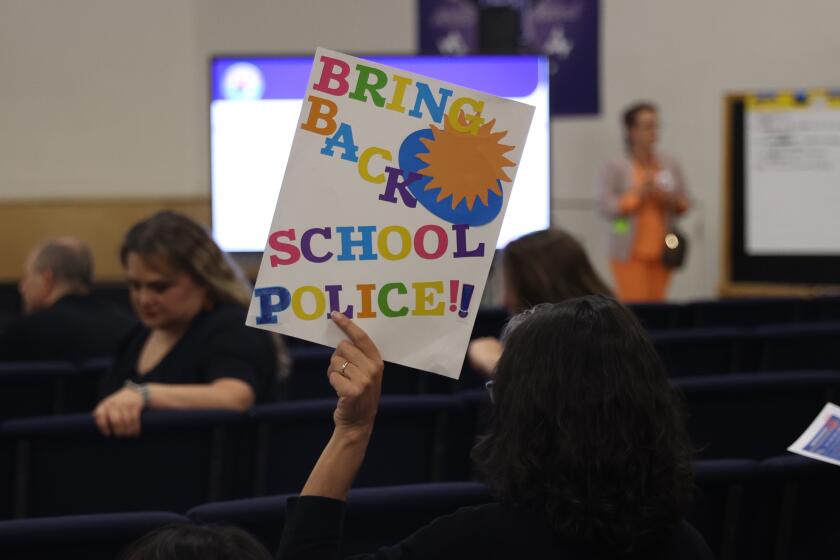Reaching Tough Boys Takes Lot of Attention
Think back and remember the two or three worst-behaved kids in your junior high or high school.
Then picture a class made up of nothing but students like those. If you take the one or two worst kids from that class, you have youths who almost can’t be reached by any teacher, according to Gil Ontiveros, resource specialist at the Fred C. Nelles School for Boys, a division of the California Youth Authority.
However, these students often can be reached by a special group of people who handle with ease what Ontiveros called “the worst of the worst.” The special people are foster grandparents, and they reach the youths by earning their respect, giving them lots of individual attention and by not posing a threat, as more authoritarian figures seem to do.
Foster grandparents have been a part of the Nelles School for years, offering companionship to the inmates and helping to tutor students in the classroom. Now the program is being expanded.
Soon, in addition to the 23 grandparents who currently serve at Nelles, about a dozen foster grandparents will be tutoring at the Norwalk-based Southern Reception Diagnostic Center. But there is a new twist to the program as it is being developed. The new foster grandparent volunteers will all be trained in the Laubach literacy method of one-on-one tutoring, to enhance the grandparents’ classroom effectiveness.
The grandparents will be paid a tax-free stipend of $2.20 an hour, receive a free meal each day they tutor and get a transportation allowance. Once trained at Nelles, they will transfer to the Norwalk center, tutoring young men in reading and helping students in the classrooms four hours a day, five days a week.
The Norwalk facility has never had a foster grandparents program. It is a diagnostic facility only, the first stop for young men arrested and sentenced by the court to the California Youth Authority. From the center, the wards are sent to long-term institutions to serve their sentences.
The Laubach tutoring will be an attempt to “bridge the education” of the boys during their stay at the Norwalk center, Supt. Ralph Barrientos said.
“They’re not here long enough to complete a semester or even a quarter,” Barrientos said. Boys are usually kept at Norwalk for two months, but the stay has lengthened to an average of 70 days because of crowded conditions in the center and lack of additional manpower to process increased numbers, he said. The foster grandparent-tutor program is intended to help prepare the boys for schooling at their permanent facility.
The director of the Nelles foster grandparent program, Cathy Carlson, said that training foster grandparents in the Laubach method was done a few years ago at Nelles. When the director of the program left, the training program died.
Program Was Revived
The Laubach idea was revived last year by Ontiveros when an informal study showed that nine of every 10 youths at Nelles, who range in age from 13 to 17, could not read or write above a fourth-grade level.
The method, which emphasizes phonics and one-on-one tutoring, was developed in the 1930s to help adults achieve literacy in any language, and it has been adapted to a structured teaching method, according to Donald Nutter, past president of the nonprofit California Literacy Inc. The method is used in libraries and by volunteers nationwide. There are no educational requirements for Laubach trainees, Nutter said, other than the ability to read and write. Training takes 16 hours.
Tutors working in the Nelles school say that some students are illiterate when they arrive.
‘Start From Scratch’
“Sometimes you have to start from scratch--they don’t even know the alphabet,” said 66-year-old Blanche Moreno, who has been a volunteer foster grandparent at Nelles for more than five years.
Tutoring the students is highly rewarding, Moreno said. “I look forward to going to work every day. On days off, I sometimes get permission to visit some of the boys who don’t get any visitors. They get so depressed. Sometimes on holidays, I take them some goodies, bake cookies.
“And they say, ‘Thank you, Grandma,’ every one of them. That’s why I feel my work is not in vain. I get involved with my boys. Black, brown or white, I call them all ‘my boys.’ ”
Another Nelles foster grandmother, 78-year-old Georgia Beebe, said, “Some time ago, I had a 15-year-old, and I asked him the time. He hung his head, and I said, ‘You can’t tell time, can you?’ He shook his head. I taught him to tell time right there. That’s when it’s wonderful. When you know you’ve helped.” Carlson said that the grandparents often establish rapport almost immediately. The students respect the grandparents, she said, and are not threatened by them, as they sometimes are by teachers.
Six Grades in One Year
Alberta Markstrom, 84, who has been a volunteer at Nelles for 14 years, told of a 17-year-old she tutored once: “He had never been to school. He had spent one day in kindergarten and he never went back. He had been at Nelles three years, and they couldn’t teach him. He would fight the teachers and refuse to study. Then they gave him to me, and he learned so fast, I couldn’t believe it. He finished six grades in one year. It’s so gratifying. One boy wrote me a note and said he would never forget me.”
Foster grandparents must be over 60 and have an income at the federal poverty level to qualify for the federally funded program. There is no maximum age. Applications are being accepted at Nelles School now. Carlson said the program is expected to be functioning in Norwalk by mid-March.
Alice Moore, 78, who is a tutor in the intensive counseling, or “lock-up” unit at Nelles, which is for students who do not fit into the classroom, said, “It hits home to me. I’ve been on my own since I was 16. I try to give the boys hope. I tell them, ‘You’re only 16, 17 years old. Your whole life is ahead of you.’ And I can see them change. I love this work. I feel that I’m making a real contribution. I don’t feel that any human being should be thrown away.”
More to Read
Start your day right
Sign up for Essential California for news, features and recommendations from the L.A. Times and beyond in your inbox six days a week.
You may occasionally receive promotional content from the Los Angeles Times.






